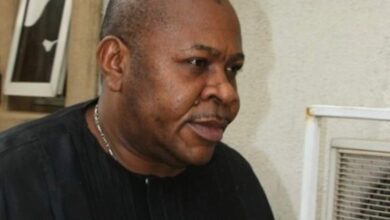Court sets May 13 to hear Akpabio’s contempt claims against Natasha

The Federal High Court in Abuja has adjourned to Tuesday, May 13, for a definite hearing on the contempt allegations filed by Senate President Godswill Akpabio against the suspended Senator representing Kogi Central, Natasha Akpoti-Uduaghan.
Justice Binta Nyako fixed the new date after the second and third defendants notified the court that they had filed an application accusing the plaintiff of contempt.
The dispute between Akpabio and Akpoti-Uduaghan stems from a disagreement during plenary on February 20 regarding seating arrangements. The issue escalated when Akpoti-Uduaghan, speaking on a television programme, made allegations of sexual harassment against Akpabio.
In the aftermath, Akpoti-Uduaghan approached the Federal High Court to restrain the Senate Committee on Ethics, Privileges, and Public Petitions from probing her actions. Her ex parte application, marked FHC/ABJ/CS/384/2025, named the Clerk of the National Assembly, the Senate, the Senate President, and the committee’s chairman, Senator Nedamwen Imasuen, as respondents.
On March 4, the court issued an order halting disciplinary action by the Senate. Nonetheless, just two days later, on March 6, the Senate suspended Akpoti-Uduaghan, citing a report by the ethics committee that accused her of gross misconduct—despite the ongoing court proceedings.
Further complicating matters, on April 4, Justice Nyako barred all parties from giving media interviews or posting on social media about the case. This move came after Akpabio’s counsel claimed that Akpoti-Uduaghan had continued speaking to the press in breach of the court’s order.
At Monday’s hearing, Akpoti-Uduaghan’s legal team, led by Jibrin Okutekpa, told the court that all necessary filings were complete and that they were prepared to proceed. Representing the defendants were Charles Yoila (1st defendant), Paul Daudu (2nd), Ekoh Ejembi (SAN) (3rd), and Valentine Offia (4th).
Despite the defence team confirming compliance with the court’s orders, Daudu raised a fresh issue, alleging that Akpoti-Uduaghan had violated the no-social-media directive.
“This matter is coming up for definite hearing. The second defendant has filed its schedule of hearing. Ordinarily, we are ready to proceed, but a further affidavit was served on me just on Friday, which I am entitled to respond to.
“This court ordered that there should be no social media posts, but there was one. The plaintiff herself posted a satirical apology on her Facebook page,” Daudu said.
Akpabio’s lawyer, Ejembi, backed the claim, adding, “We are alleging that the Facebook post made by the plaintiff is a mockery of the court’s proceedings. We tender a Punch newspaper report showing she made the post despite the court’s order.”
In defence, Okutekpa maintained that the Facebook post was unrelated to the current proceedings and pertained to the earlier sexual harassment allegation.
“Our counter-affidavit concerns only the matter before the court. The satirical post has no connection to it,” he argued, further urging the court to expedite the main hearing, as Akpoti-Uduaghan had been absent from her legislative duties for a cumulative 68 days.
Justice Nyako, however, emphasized that the contempt issue must be resolved first.
“I cannot proceed with this matter until I conclude on the issue of contempt. If there is contempt, I have to hear and determine it first,” she stated.
In response, Akpoti-Uduaghan’s counsel raised a counter-contempt allegation against all the defendants.
“My Lord, you have paused this trial over a contempt allegation. We also have an issue of contempt against all the defendants,” he said.
Justice Nyako sternly warned that continued defiance of the court’s orders would not be tolerated.
“I have the power to summon all your clients to appear in court. If counsel or litigants disobey the court, then the court has no business hearing them—that is my position,” she cautioned.
Turning to Akpoti-Uduaghan’s legal team, she added: “If you have an application for contempt, bring it forward so the court can hear it.”
“You cannot allow your client to disrespect this court. If they are found in contempt, they will face punishment. If not, the court will proceed.”





